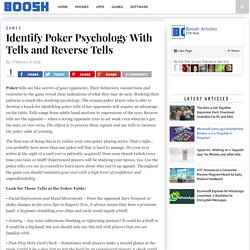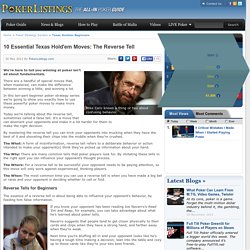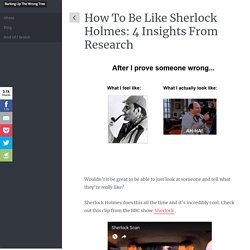

If you want to be a master poker player, you have got to master your body language–and know how to be a master at reading tells.

I get asked all the time in my body language and human lie detection trainings if nonverbal science works in poker. And the answer: Heck yeah! Body language is essential for poker players! Nonverbal science adds a whole new dimension to the game. Poker Experts Talk Body Language: Zach Elwood – author of Reading Poker Tells “There are certain things I tend to look for in inexperienced live players – things like stillness and movement; as a general rule people who are relaxed will show more movement in spots as opposed to someone who is anxious, they are a little more still and tense.
Someone who is relaxed might show more looseness in how they gather their chips when they put in a bit, or how they place the bet, or after the bet. Another thing I tend to look for is bet timing. Here are Zach’s selected poker tells based on nonverbal: The Power of Body Language. Spotting Poker Bluffs by Paul Ekman. May 2014 The game has changed now that TV broadcasts people playing poker.

In the old days not a word was spoken, and that tradition continues today in some venues. But lies had to be spotted; bluffs called. I learned about this from winners of the International Poker Tournament held each year in Las Vegas. It costs $15,000 to enter the fray, and then, after two weeks of serious gaming, the winner walks away with a million bucks. Two of the winners, in different years, sought my advice knowing that I am an expert in spotting liars. You can’t win without bluffing, but you can’t win if you can’t spot the bluffers. The key to winning, each said, was spotting bluffs. Identify Poker Psychology With Tells and Reverse Tells.
Poker tells are like secrets of your opponents.

Their behaviors, mannerisms and reactions to the game reveal clear indications of what they may do next. Studying their patterns is much like studying psychology. The woman poker player who is able to develop a knack for identifying poker tells of her opponents will acquire an advantage on the table. Tells range from subtle hand motions to expressions of the eyes.
Reverse tells are the opposite – when a strong opponent tries to act weak even when he’s got the nuts, or vice versa. The first way of doing this is to realize your own poker playing styles. Look for These Tells at the Poker Table: • Facial Expressions and Hand Movements – Does the opponent have frequent or shaky changes in the eyes, lips or fingers? • Anxiety – Any voice inflections, blushing or tightening posture? • Post-Flop Hole Card Check – Sometimes weak players make a second glance at the cards. . • Chip Stack – Are the player’s chips messy or neat? 10 Essential Texas Hold'em Moves: The Reverse Tell. There are a handful of special moves that, when mastered, can make the difference between winning a little, and winning a lot.

In this ten-part beginner poker strategy series we’re going to show you exactly how to use these powerful poker moves to make more money. Today we’re talking about the reverse tell, sometimes called a false tell.
How To Read People Like Sherlock Holmes: 4 Insights From Research. Wouldn’t it be great to be able to just look at someone and tell what they’re really like?

Sherlock Holmes does this all the time and it’s incredibly cool. Check out this clip from the BBC show Sherlock. Of course, Sherlock Holmes is a fictional character and nobody can read people quite that well. We can all get better at it, though. But where do you learn a skill like that? So I called a guy who has the answers: Sam Gosling. Sam is a personality psychologist at the University of Texas at Austin and author of the book Snoop: What Your Stuff Says About You. What really works (and doesn’t) when reading people.How to get more accurate first impressions.What someone’s home or office can tell you about them.What someone’s Facebook profile really says about their personality.How to tell when someone is faking and putting up a false front.
Okay, put on your deerstalker cap and let’s get to work. What Sherlock Gets Wrong — And How You Can Get It Right.